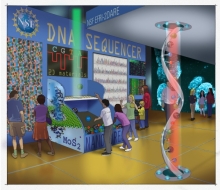Professors Receive Grants to Study Biological Applications of New 2-D Materials

Graphene, a one-atom-thick lattice of carbon atoms, has been the focus of intense research since its discovery more than a decade ago. Effectively two-dimensional, graphene has unique physical properties and ultra-high conductivity and promises to revolutionize electronic devices as the ability to mass produce it grows.
However, graphene is only one member of a large family of two-dimensional materials, each with its own unique and useful properties.
Now, two University of Pennsylvania nanotechnology experts have received a pair of $2 million grants to expand their graphene research into these new thin-as-possible materials.
A.T. Charlie Johnson, director of Penn’s Nano/Bio Interface Center and professor in the Department of Physics and Astronomy in Penn Arts and Sciences, and Marija Drndić, also a professor in Physics and Astronomy, are independently each leading one of the 10 teams that received grants from the National Science Foundation’s Office of Emerging Frontiers in Research and Innovation.
Collaborations between these two NSF EFRI teams over the course of their four-year grants are likely.
“Penn’s strength at the intersection of nanotechnology and biology made this possible,” Johnson said. “Other groups focus on the physics and chemistry of these materials. Exploring the applications in biology and medicine is something that is not as common but where we have a wealth of talent and existing collaborations through the NBIC.”
To view the full article, click here.





